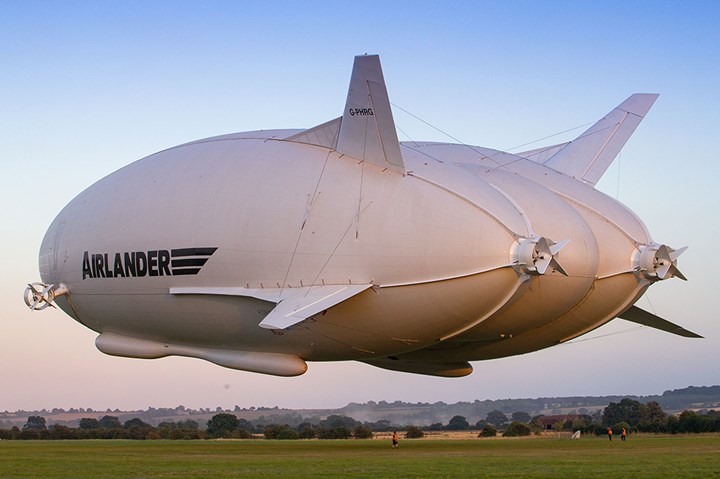Collins Aerospace ramps up electric motor development for Airlander 10 airship
Collins Aerospace completes design review and begins fabrication of a 500-kilowatt electric motor for the composites-intensive aircraft, with flight qualification testing to occur in 2023.

Photo Credit: Hybrid Air Vehicles
On June 29 Collins Aerospace (Solihull, U.K.), a Raytheon Technologies (Waltham, Mass., U.S.) business, announced it has completed critical design review and started fabrication of a 500-kilowatt (kW) electric motor for the Airlander 10 aircraft (which makes extensive use of composites, see “Airlander 10: The future of zero-carbon aviation”) under a partnership with Hybrid Air Vehicles (HAV, Bedford, U.K.) and the University of Nottingham.
Flight qualification testing of the motor is expected to occur in 2023, followed by hybrid-electric operation of Airlander 10 by 2025 and all-electric, zero-emission operation by 2030. To achieve these improvements, the airliner’s four fuel-burning engines will be replaced by Collins’ 500 kW electric motors, beginning with the two forward engines in 2025 and the two rear engines in 2030.
Collins reports that it is designing and testing the motor at its Electronic Controls and Motor Systems Center of Excellence in Solihull, U.K., where it recently invested $18 million to expand the campus and add world-class power electronics and motor development capabilities.
“Airlander 10 has the potential to be the world’s first zero-emission aircraft, while pioneering game-changing electric flight technologies in the process,” says Marc Holme, senior director, Electronic Controls and Motor Systems for Collins Aerospace. “As the aerospace industry continues to look for ways to reduce its carbon footprint, electric propulsion offers a significant solution that will create a more sustainable future for our industry and our planet.”
The Airlander program expects to address key goals of the U.K. Aerospace Technology Strategy including strengthening the U.K.’s aerospace capabilities, positioning the U.K. for developing future generations of civil aircraft and advancing a new generation of efficient propulsion technologies.
“The Aerospace Technology Institute has clearly identified the importance of technology developments to support sustainable aviation through the U.K. Aerospace Technology Strategy, Accelerating Ambition,” adds Mark Scully, the Aerospace Technology Institute’s head of Technology – Advanced Systems & Propulsion. “HAV’s Airlander 10 offers a unique opportunity to deploy innovative, high-performance motor technology from Collins Aerospace initially in hybrid propulsion and, in the future, all electric propulsion configurations. These technology developments will enable economic growth and jobs in the U.K. aerospace sector.”
Related Content
-
Plant tour: Joby Aviation, Marina, Calif., U.S.
As the advanced air mobility market begins to take shape, market leader Joby Aviation works to industrialize composites manufacturing for its first-generation, composites-intensive, all-electric air taxi.
-
Plant tour: Albany Engineered Composites, Rochester, N.H., U.S.
Efficient, high-quality, well-controlled composites manufacturing at volume is the mantra for this 3D weaving specialist.
-
Sulapac introduces Sulapac Flow 1.7 to replace PLA, ABS and PP in FDM, FGF
Available as filament and granules for extrusion, new wood composite matches properties yet is compostable, eliminates microplastics and reduces carbon footprint.
















